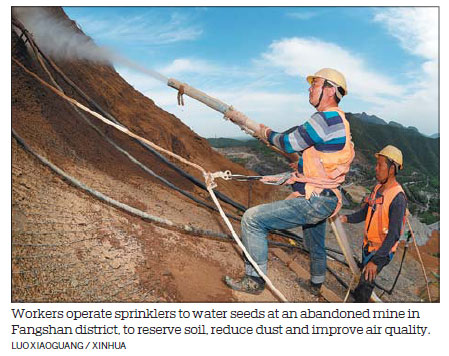Rule of law helps clean urban air
Beijing improved its control on air pollution in the past year, highlighting improved management, rule of law and co-management.
Improved management was the key measure to prevent and control air pollution in 2018, media in Beijing reported. Related authorities have focused on the most pressing issues.
They persisted in a work mechanism that has been applied in 10 subdistricts, towns and townships that have the worst air quality every week. Authorities also checked and meted out punishments over dust levels, restaurant emissions and open-air barbecues.
Every month, the local government checked air quality of each region, analyzed problems and suggested solutions. Every quarter, authorities would analyze situations and carry out studies.
Li Xiang, an official at the Beijing bureau of ecology and environment, said the city focused on controlling pollution created by diesel-powered heavy-duty vehicles, dust and volatile organic compounds in 2018.
Diesel-powered trucks are on local authorities' list of priorities. Since measures were taken on April 20, 2018, about 145,000 vehicles have been added to the blacklist because of excessive emissions. Leading logistics companies responded by buying 11,000 new-energy trucks to replace fossil-fuel ones.
As for dust, 1,020 coarse particle monitoring sites were set up and authorities focused on road sweeping and cleaning. They checked the management of construction dust, road dust and cars carrying building materials, such as sand.
Authorities then circulated criticism of more than 250 companies whose dust management was not up to standard. Fifty-six enterprises were stopped from bidding in Beijing for 30 to 180 days.
Law enforcement and inspections have also been strengthened. Focusing on 38 roads going into Beijing, main inner-city routes and parking lots, traffic control departments were put in charge of stopping vehicles so that ecological and environmental authorities could carry out inspections.
Special law enforcement has been carried out in industries such as furniture, print, vehicle repair and dining. Every week, authorities examine the restaurants and other institutes in the dining sector in different districts.
Beijing has used rule of law as a guarantee to control air pollution and improve local regulations on environmental protection. It has also stepped up the drafting of regulations to prevent and control pollution by hazardous waste.
It released a plan to reform the environmental damage compensation system and set up a team for that work.
The city also encouraged co-management and local government agencies, companies and residents to cooperate to prevent and control air pollution.
Industrial companies have shouldered their responsibility and met emission limits. Thirty-one such businesses reduced their pollutants, such as volatile organic compounds, by upgrading technology.
Meanwhile, local residents have paid attention to environmental topics and participated in an environmental culture week, speech contests and contacting environmental complaint hotlines.
songmengxing@chinadaily.com.cn

(China Daily 02/21/2019 page7)














